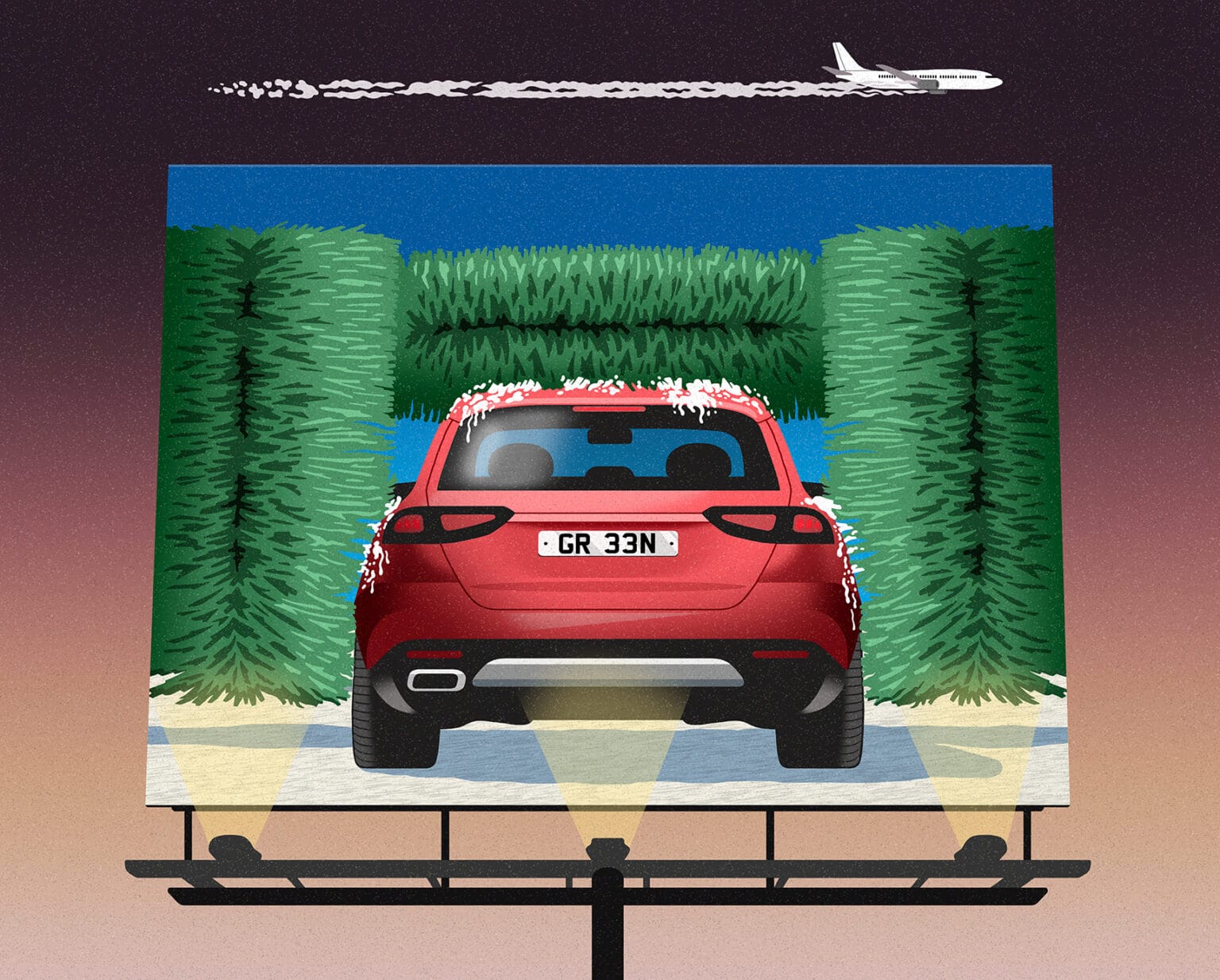Major car and airline companies are using adverts that greenwash their business while continuing to push highly polluting products that put the world’s climate goals at risk, DeSmog can reveal.
A DeSmog investigation, commissioned by Greenpeace Netherlands, analysed more than a thousand Facebook and Instagram adverts placed by ten well-known European transport brands in the last year.
The analysis found that car companies – Peugeot, Renault, Citroën, Fiat and Jeep – are touting “green” products and initiatives in the majority of their advertising while simultaneously using ads to push highly polluting vehicles such as SUVs.
The car firms promoted battery-powered cars and hybrids in over two thirds of their adverts. This low-carbon image is out of step with the reality of fleet production figures – both current and projected – which reveal a business model wedded to sales of fossil-fuel powered vehicles.
The study revealed that airline companies, by contrast, mostly chose to ignore the climate crisis altogether in their advertising. “Lower-carbon” flights featured in less than ten percent of industry ads, which chose instead to incentivise air travel with deals, low-cost offers and promotions.
Despite green pledges, all the companies analysed – both cars and airlines – have lobbied against measures to reduce emissions, either directly or through industry groups.
“European car and airline companies are using PR strategies like these to sell products that burn vast amounts of oil,” explains Silvia Pastorelli from Greenpeace. “These adverts are dangerous because they reassure consumers, when they are actually making choices that increase the likelihood of devastating climate impacts,” she says.
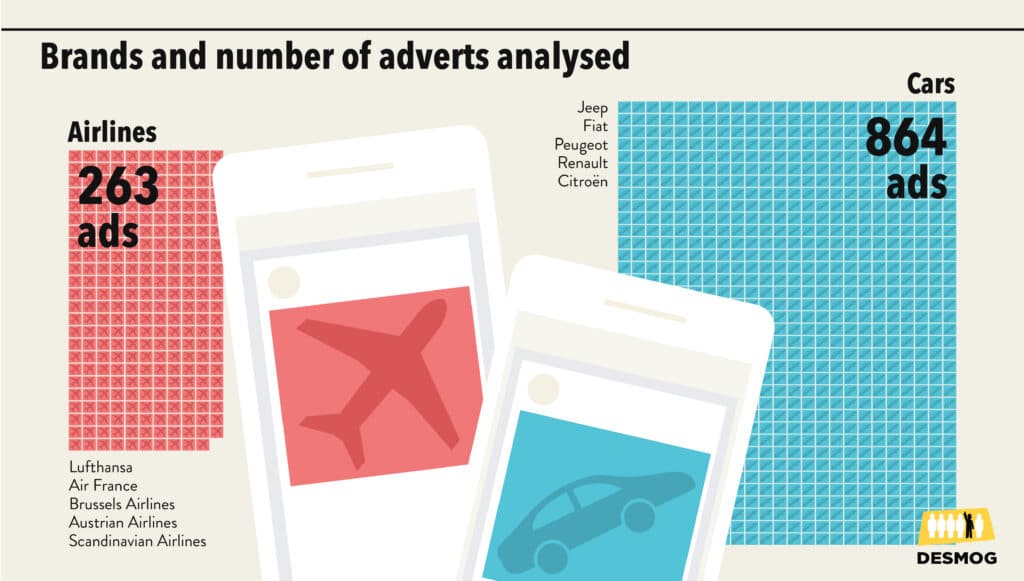
‘Misleading’ Car Adverts
Car manufacturers are responsible for nine percent of global emissions, according to recent analysis by Greenpeace that takes into account vehicle manufacturing and disposal. And despite decades of warnings, almost all car companies are moving far too slowly towards phasing out conventional cars.
DeSmog’s research found that while a majority of companies’ adverts promoted lower-carbon vehicles, this was out of proportion to companies’ actual sales.
The companies’ sales of lower-emissions vehicles ranged between 12.8 and 30 percent of overall vehicle sales in Europe, where the adverts analysed were targeted. (Worldwide, sales of low-emission cars are even lower.)
These sales fall far below the 70 percent of car adverts that promoted lower-carbon electric vehicles and hybrid vehicles.
The high volume of company ads for greener cars risk “misleading” the public, according to Robbie Gillett from the Adfree Cities network.
“Car companies can hide behind these adverts for plug-in-hybrids and fully electric vehicles, which actually don’t represent the majority of sales,” he says. “It allows companies to present themselves as greener than they are.”
Recent research by climate and energy think tank Influence Map shows that – like almost all car manufacturers – none of the brands analysed by DeSmog are aligned with the IEA’s 1.5C scenario for decarbonizing the transport sector, which requires a rapid scale-up of battery electric vehicles. The brands are also members of key industry bodies that are pushing back against green targets.
“Advertising campaigns will sell more vehicles of a certain type. So, in that sense, it’s a good thing that automakers are promoting electric vehicles far more than they used to,’’ says Ben Youriev from Influence Map.
“But in many cases, while green PR campaigns are going on, in the background car companies are lobbying – either directly, or indirectly through their industry associations – against climate legislation.”
Some lobbying is aimed at delaying the phase-out of hybrid cars, as well as conventional vehicles. While less polluting than cars entirely fuelled by petrol and diesel, research suggests hybrids are only marginally less emitting when real world data on their use is taken into account.
Under the EU’s current phase out plan, all petrol and diesel engines will cease to be sold by 2034. A representative from Renault was quoted last year saying the firm will “fight to keep the hybrid alive” past this date.
Stellantis – the parent company which owns four of the brands analysed – and Renault were both contacted for comment.
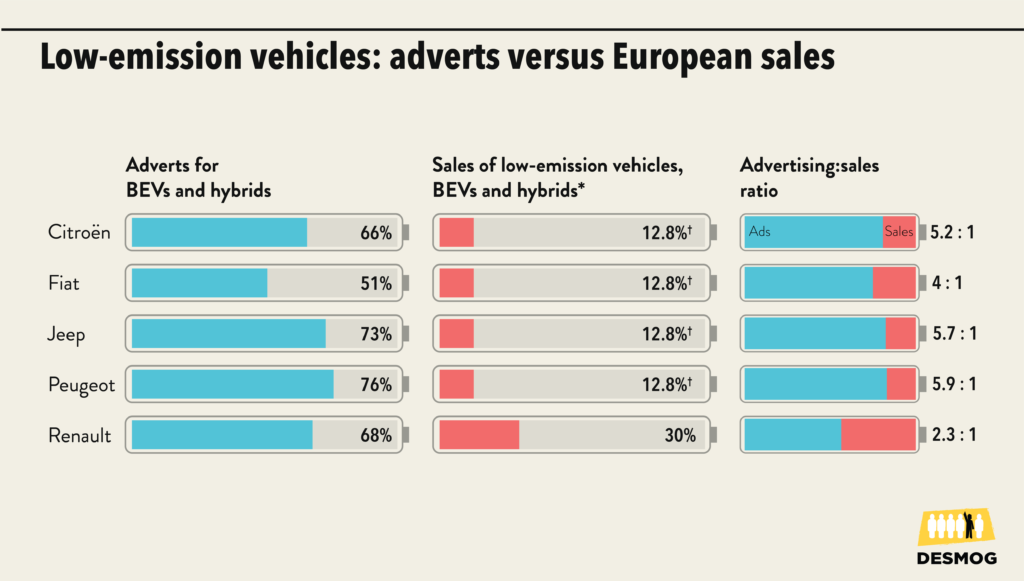
†The low-emission vehicle sales figures for Citroen, Fiat, Peugeot and Jeep are an average drawn from their parent company Stellantis, which does not break down sales data across its different brands.
SUVs Booming
DeSmog’s analysis also found that a significant minority of adverts were dedicated to promoting highly polluting vehicles. SUVs in particular emit more than regular-sized cars and return higher profits. Petrol and diesel cars are more profitable than electric equivalents as they are cheaper to make.
One in four adverts promoted conventional cars that were entirely powered by fossil fuels, while 41 percent promoted SUVs that were hybrid or powered entirely by fossil-fuels.
The growth of SUV production is identified as a key threat to decarbonizing the transport sector. Sales of SUVs have more than doubled in the last decade and risk canceling out much of the emissions reductions gained from the uptake of electric vehicles. Taken together, their combined emissions are greater than those of some major industrial nations, including Germany.
“The companies are making a lot of money from SUVs so they continue to market those but emphasize sales of EVs at the same time,” says Karen Sokol, a professor at Loyola University New Orleans College of Law. “The danger is that company ads risk allowing them to continue business as usual.”
“They are still plugging those things – people getting out in nature, with these fossil fuel guzzler vehicles that you are supposed to need in this terrain or whatever. It’s as if they are pretending to actually do something to shift the energy sources when they are not – or at least not at the pace required.”
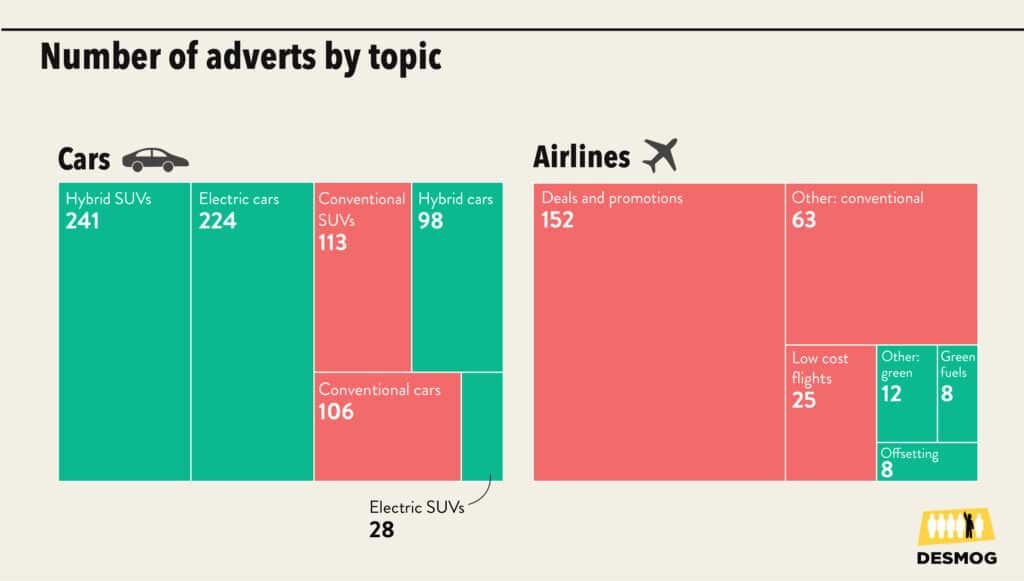
Airline Ads Ignore Climate Crisis
The aviation industry is responsible for around 5 percent of global heating. While lower than other sectors, aviation remains a sector of particular concern to climate scientists. According to one industry analysis, the number of passenger flights will more than double by the year 2050 compared to 2019. Meanwhile, technologies to make flying more sustainable remain in their infancy.
The majority of ads analysed – all of which were published in 2021, when pandemic restrictions were being lifted – emphasized low-cost flights and deals.
A majority of flight adverts (90 percent) made no mention of sustainability, while 56 percent promoted flights that were made cheaper or easier to book through discounts and promotions.
Three out of five airlines analysed by DeSmog – Brussels Airlines, Air France and Scandinavian Airlines – made environmental claims in their adverts. Air France and Brussels Airlines emphasized more efficient use of energy, with the latter also publicizing a “carbon neutral” target which it plans to reach through a mix of more fuel-efficient planes and carbon offsetting.
A spokesperson for Lufthansa Group, which owns the Lufthansa, Brussels and Austrian airlines included in the analysis said: “We are committed to reducing the environmental impact of flying” and that they worked to keep the public informed on the efforts they were taking to reduce their emissions, which they aim to cut to to zero by 2050.
Scandinavian Airlines stood out as the one firm that dedicated the most significant number of adverts to the environment – focusing on offsetting, the use of “sustainable aviation fuels” (SAFs) and electric planes in more than a quarter of its adverts.
Campaign group the Aviation Environment Federation have labelled the green initiatives marketed by airlines as “uncertain” or “unrealistic” solutions.
Flying is harder to decarbonise than many other sectors. Alternatives to current fuels, such as SAFs – derived either from biofuels, or from chemical processes using renewable energy – are currently only used on a very small scale, and experts say they will be very challenging to scale up. This has led to a reliance on offsetting schemes, which have been widely criticised.
Meanwhile, though more efficient planes have helped reduce emissions per flight, carbon savings from newer aircraft have been cancelled out by the growth in demand for flying.
Scandinavian Airlines (SAS) said in a statement: “There are important challenges that have to be solved in order to make air travel more sustainable. SAS and the global air transport industry has adopted a long-term goal of net-zero carbon emissions by 2050. A mix of new technology – including potentially shifting to electricity and hydrogen, improvements in operations and infrastructure; and the transition to sustainable aviation fuel will lead the industry to the goal.”
With just nine percent of adverts featuring green themes, the airline industry was pushing environmental credentials far less than the car industry. Cait Hewitt, from the Aviation Environment Federation, puts this down to a lack of viable technology.
“They haven’t got so many good options to talk up. Aviation doesn’t really have any on the market,” she explained. “So it’s all about the future. ‘We are going to develop these sustainable fuels’ or ‘hydrogen aircraft’, that kind of thing. Sustainable aviation fuels are the next big thing the industry wants to talk about as a solution. But they haven’t quite got there, in terms of public recognition, to be able to actually put it in an advert yet.”
Simms puts the lack of green ads to airlines down to successfully staying out of the line of fire – and out of Paris climate agreements.
“They’ve played an incredibly clever game. I am not surprised [at the lack of green ads] because from a public image and perception management point of view, the aviation industry has been less subject to the kind of pressure that the car industry is under,” he says.
Gillett believes that marketing that fails to mention the climate crisis – given its urgency – is “grossly irresponsible” and requires us to update our definition of greenwashing.
“The idea of greenwash is expanding to include the presentation of a polluting product, such as an airline ticket, that does not mention the need to cut down on that product in the short, medium and long term – that’s a form of greenwash as well,” he says.
“It’s presenting that product as unproblematic and omitting key information about its long term use.”
SAS said in a statement: “The undoubted economic and social benefits of aviation come with an environmental cost. Therefore SAS, and the industry, has set short and long term climate targets so that future generations can benefit from connectivity that only aviation can provide. SAS will decarbonize our business, that is our long term promise.”
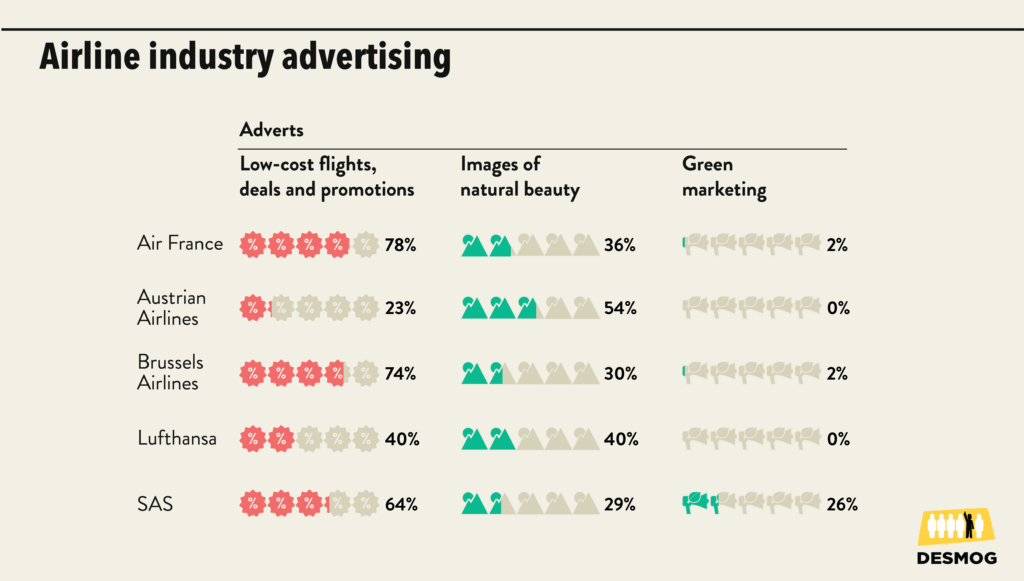
Pressure Grows on Fossil Fuel Advertising
Research by Greenpeace has shown a direct link between car and airline advertisements and increased greenhouse gas emissions. In 2019, car and airline adverts are said to have led to additional emissions greater than those of the Netherlands.
Campaigners are increasingly highlighting the mismatch between adverts that promote the products and industries that scientists say need to be cut back and reduced, if the world is to maintain a liveable climate.
In April, the world’s leading climate scientists highlighted the role advertising has played in obstructing climate action and deflecting responsibility for climate change.
Meanwhile a call to ban fossil fuel adverts is gathering support across Europe. It’s championed by campaigners who point to the crackdown on tobacco advertising – which faces a near total ban in the UK and Europe – as an important precedent.
“Sometimes you’ll see those warnings about climate change and advertising high carbon products on the same page in the same newspaper, or on the same digital billboard,” says Gillett. “And that mismatch is starting to be noticed by the public.”
Sokol said calls for a ban were justified: “That shift is important – it’s like marketing deadly products,” she says. “This is something that has to be banned: we can’t use fossil fuels anymore, and we’ve got to be consistent with what the science tells us. We’ve got to start thinking very differently.”
All the companies analysed in the research were contacted for comment.
Editing by Hazel Healy. Data collection by Michela Pittalis, Ingvild Deila, Bo Frohlich, Mariangela Castillo, Katherine Besenyei, Kate McMahon and Charlotta Lahnalahti.
You can read a full breakdown of DeSmog’s findings in Greenpeace Netherlands’ Words Vs Actions report.
Subscribe to our newsletter
Stay up to date with DeSmog news and alerts


